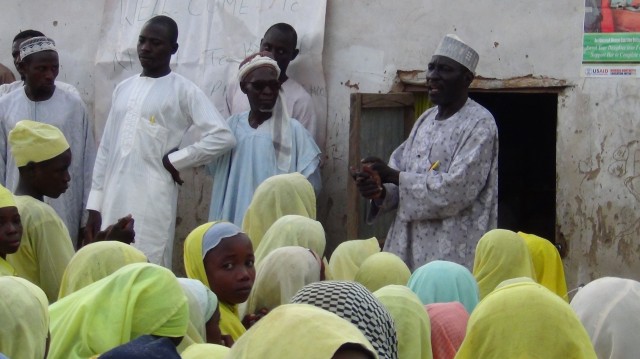
Tanko Mohammed is proud to be a teacher at a small school in Kyata, a peasant farming village at the outskirts of a sleepy town on the western edge of Bauchi State, Nigeria. He began his career in 1980, and today Malam Tanko teaches literacy and math to 70 fifth and sixth-graders at Kyata Islamiyya Primary School.
“When children understand my lessons, I am satisfied,” Malam Tanko says.
On World Teachers Day, Creative Associates International celebrates educators like Malam Tanko, who does all he can so his students can learn and progress. He takes great pride when they are able to score well enough to enter Nigeria’s formal school system.
Like most teachers in his region, however, Malam Tanko rarely received feedback on his teaching methods, or learned effective ways to handle his large classes. Even after decades of teaching, he was figuring everything out on his own—and hoping it was enough.
Without the requisite manpower, teachers in northern Nigeria have inadequate resources and supervision, poor infrastructure and often use a truncated or subjective training model. Teacher preparation, professional development and supervision remain a great challenge here, resulting in poor attainment of the UN’s Education for All Goals.
School supervision is also egregiously lacking: More than 90 percent of supervisors have never been trained on modern methods of school supervision and support. Some schools in northern Nigeria were not visited for more than five years.
When they do arrive, supervisors rarely offer solutions to educational content, pedagogy, lesson planning or handling large classes.
Mentoring Teachers
But things are changing for teachers in Bauchi and Sokoto states, where Creative and its partners launched a program funded by the U.S. Agency for International Development to increase their professional skills through school-based teacher training.
Creative’s Nigeria Northern Education Initiative (NEI) developed activity-based manuals and used them to train more than 2,000 classroom teachers and facilitators in four thematic areas: literacy; math; life skills; and psychosocial counseling.
A group of mentor teachers specially selected through a thorough screening process were trained to facilitate all the workshops, provide school support visits and act as advisers for school supervisors and teachers.
With the competence and experience needed to carry out capacity development for teachers, as well as serve as “critical friends” of schools, these mentor teachers fostered an environment of community learning, with a collective vision for school effectiveness, school improvement and the formation of successful learners.
For Malam Tanko, it was his mentor teacher Charles Motanya, who allowed the primary school teacher to greatly improve in the classroom.
Motanya, a teacher in Azare College of Education’s Primary Education Studies Department, had participated in intensive train-the-teacher courses during the last four years through Creative’s NEI, and learned advanced teaching methods, proposal writing, life skills, psychosocial counseling, monitoring and evaluation and quality assurance.
His in-depth knowledge of education, classroom practice, classroom management and data gathering made him an asset to schools and teachers—including Malam Tanko.
Through the mentorship, Malam Tanko learned about modern lesson planning how to take a learner-centered approach to teaching that would absorb his students with activities.
“Charles has really helped me to use all the techniques I was taught by USAID-NEI,” says Malam Tanko. “My use of activity centered learning really engages the children.”
Now Malam Tanko mentors other teachers at Kyata Islamiyya Primary School, and motivates them to support the school’s newly formed management committee.
Test Scores & Enrollment Increase
NEI’s training and mentorship is yielding results: Teaching scores as measured by a performance checklist and classroom observation jumped 16 percentage points in the year following the intervention.
The evaluation results singled out noteworthy teachers including Malam Tanko, whose teaching delivery jumped from 61 percent to 80 percent over the same period.
For him, the best part of his new effectiveness in the classroom is how it translates into results for his students.
“We now have at least ten of our learners who have gained admission to junior secondary schools,” Malam Tanko says.
The improvements in teaching delivery at Kyata Islamiyya Primary School are being noticed, says Malam Tanko. The school’s population of 122 girls and 118 boys is rising as learners are transferring from other schools.
“Children are now leaving other schools to come here and learn,” he says.
It’s something that makes him especially proud to be a teacher, and happy to watch as they succeed.
“The future of the children is what drives me on to be a better teacher,” Malam Tanko says. “I want them to be good ambassadors of their teacher and their school.”